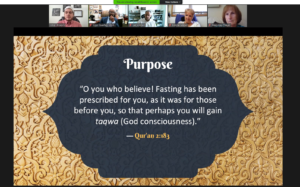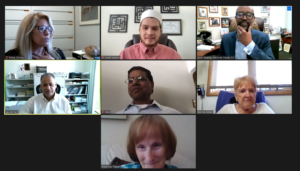
Understanding the traditions of different people groups plays a role in making a community diverse.
On April 21, Ismail Bowers, associate Imam and director of Youth Development at the Islamic Center of Greater Toledo, presented a panel about Ramadan.
This was one of the eight panels that took place in April in celebration of Arab American and Middle Eastern cultures.
23 people attended the presentation, which ended with a Q&A session.
Bowers said this was his first time doing a presentation for a panel like this.
“I really enjoyed it,” Bowers said. “People asked really great questions.”
Bowers’ presentation focused on fasting, a pillar of Islam culture.
During Ramadan, the 9th month of the Islamic calendar, Muslims fast from food, drink, sexual relations and bad character from sunrise to sunset.
Those who are sick, elderly, pregnant or nursing are exempt from fasting during Ramadan.
The goal of fasting is to gain “taqwa”, or God consciousness, Bowers said.
For Muslims, Ramadan is the month that the Quran, the primary Islamic holy book, and its scriptures were revealed, Bowers said.
As a result, Ramadan has become a month of connecting with the Quran by reading, memorizing and reciting its verses. It is also a time of worship and prayer.
In order to support Muslims who are fasting during Ramadan, it is important for people who are not Muslim to educate themselves, Bowers said. He suggested going to a local mosque to ask questions.
It can be beneficial for people who are not Muslim to try fasting for a day to see what it’s like, Bowers said.
“Muslims are just like you, regular law abiding citizens,” Bowers said. “We believe we are on this Earth for a purpose, which is to be merciful people and to obey God, who is the most merciful.”
As the director of Youth Development at the ICGT, Bowers focuses on programs and classes for high and middle school students.
He said he was inspired to become an educator because his mother was an educator, who taught over 1,000 children in her 30-year career.
“I feel like I inherited that love of teaching. The prophet Muhammad was sent as a teacher,” Bowers said. “I think education is extremely important. Ignorance is darkness. Education is light. I have a passion for trying to bring that light to people’s lives.”
MCCC President Kojo Quartey, executive assistant to the President Penny Dorcey and grant writer and coordinator Cajetan D’Cunha organize the monthly panels to highlight the topics on the college’s heritage calendar.
Quartey started these panels seven years ago, when he first started working at the college. He said he realized that Monroe was not very diverse, so he wanted to bring different perspectives to the community.
Quartey said he wanted there to be a presentation about Ramadan because it began on April 12 and will end on May 12.
D’Cunha said he contacted the people at ICGT, who connected him with Bowers.
Dorcey said she figures out a date and time for each panel, opens each meeting, records it if the presenter allows it and keeps track of those who attend.

“People are very willing to share their knowledge with the community,” Dorcey said.
Quartey said the presentation made him reflect on the similarities and differences between Christianity, the religion he practices, and Islam.
“We need to get a better understanding of different religions so we can be more tolerant and respectful, and get to a place of healing,” Quartey said. “Then, we can create a better nation and a better world for all of us.”
Community member Bonnie Weber is a regular attendee of these presentations and panels.
Weber said she and her husband took classes at the college about Arab culture and language and attended this presentation to add to their knowledge.
“I see education as something that doesn’t end when you graduate,” Weber said.
D’Cunha said he encourages students to take advantage of these presentations and panels.
“The college is offering a tremendous resource covering a range of topics,” said D’Cunha. “Spend the time to attend. One hour spent on a Zoom meeting is equal to so many more hours of research work.”
Dorcey said she, Quartey and D’Cunha are in the process of arranging presentations and panels for May, which will cover topics like Jewish American heritage and Asian American history.
“The more people in Monroe get an exposure to the wider world, the better,” said D’Cunha. “Then, they can begin discovering the true richness diversity adds to life.”

